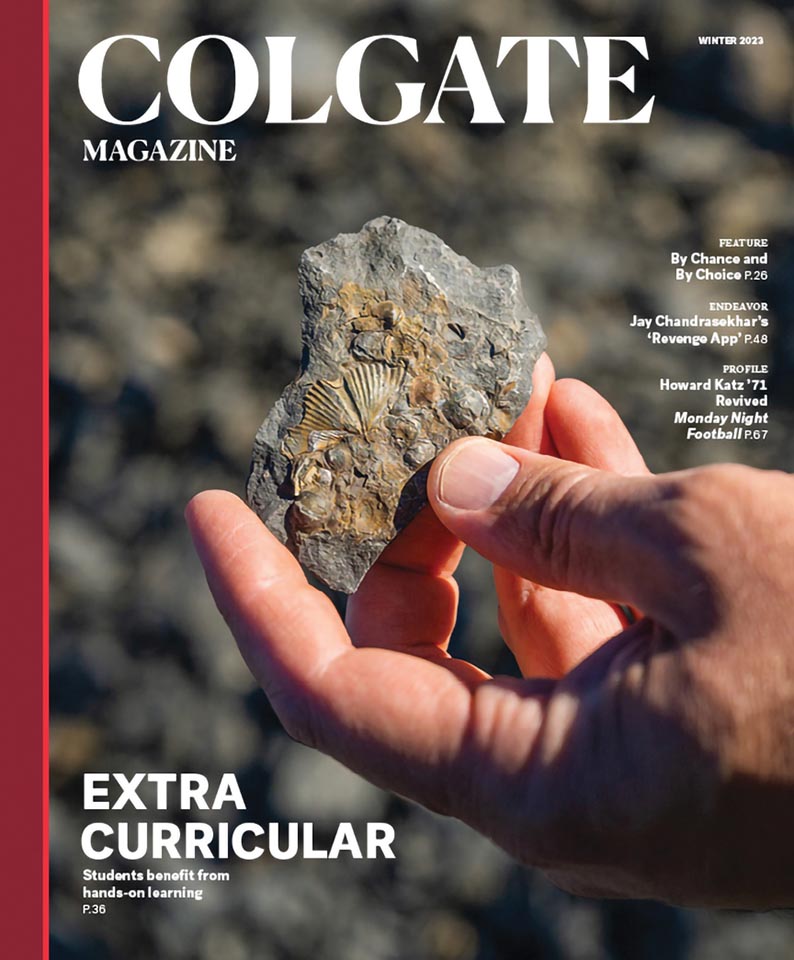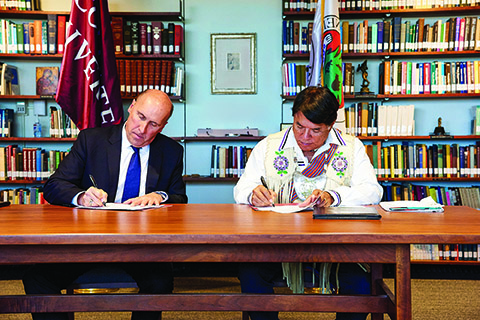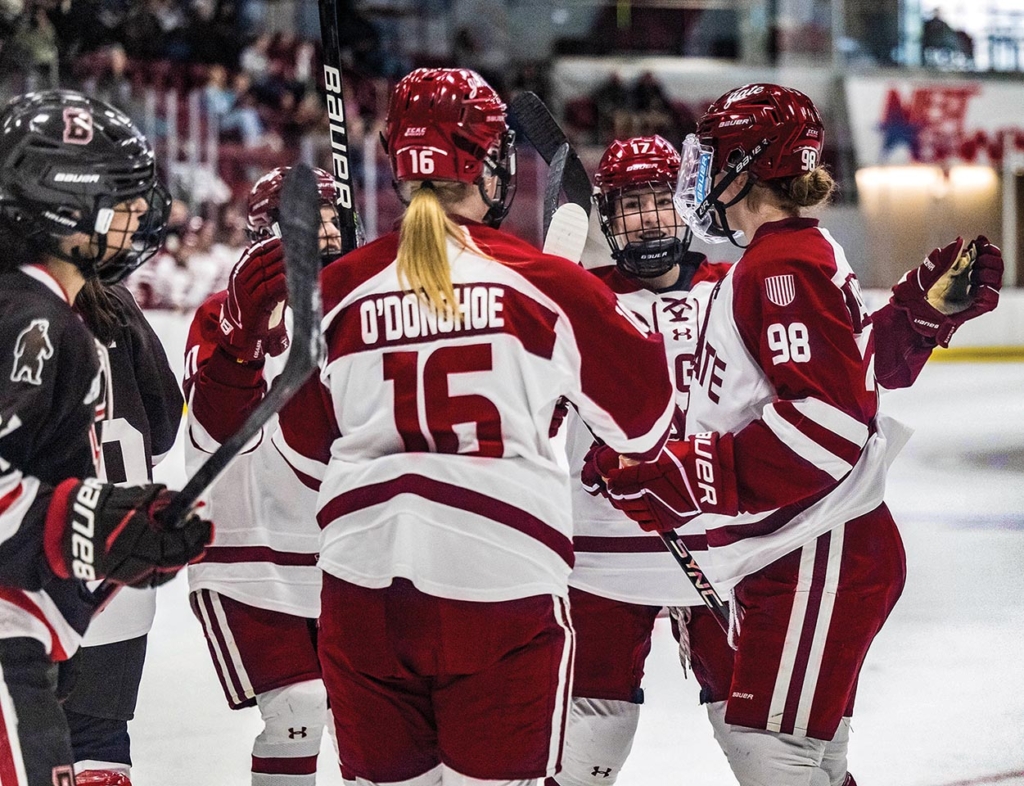The Best Yet

As an alumnus of ’61, I have been receiving the magazine for many a year. I enjoyed it from the start, memories and learning and pride of accomplishment. Mostly black and white back then, a bit of fall color now and then. And of course, Alumni News (back then, ours was near the end of the grouping, and I’d wonder about those “old ones”). And that photographer, John Hubbard, pal of a pal. The best!
I felt awkward with the changes when they came, more color, more fonts, unfamiliar topics. Still the [alumni] news, with ’61 creeping to the middle of the grouping. But I got familiar with the unfamiliar and really liked what came along.
And then change again, in recent times. Color, fonts, topics, a potpourri but always with those darn fine themes. And, hey, [photographer Mark] DiOrio, one fine eye for the best of Colgate. And ’61 news getting closer and closer to the opening page. Awkward again. “Too much ‘stuff.’ Too much youth.” Wrong again.
[I] just want to say, the [winter 2023] edition is a treasure. (I just sent “Conversations in the Hallway Still Linger” [p. 6] to a poet friend.) Memories, learning, pride of accomplishment. And such a sense of fine futures ahead. Your best yet. Thanks much.
Scott L. Shablak ’61
What Sets Colgate Apart
In response to “Conversations in the Hallway Still Linger,” winter 2023, p. 6: The faculty’s interest in teaching young adults is indeed what sets Colgate apart. Research universities do not provide this. Excellence in teaching — the fabulous faculty — is what makes Colgate so special.
Victoria Stephens ’79 Williams
Compliments
What you and your staff have done with this publication is stunning and outstanding. It far surpasses similar publications that I receive from [other universities]. The Colgate Magazine is a unique combination of substantive articles, especially about Colgate faculty/staff, alums, and current students. The material does not glorify too much, but it does focus (but not overwhelm) on substance that is relevant to just about all Colgate generations. This is an inspirational piece of writing, and a masterful accomplishment of laying it out logically yet creatively.
You make me proud to be a Colgate alum.
Edward R. Hines ’63
Respecting Indigenous People

I’d like to commend President Casey and Colgate for repatriating the funerary objects to the Oneida Indian Nation (winter 2023, p. 9). As many readers appreciate, Colgate was founded on the ancestral lands of the Oneida Nation, of the Iroquois Confederacy. A great historical record of the manner in which these lands came to be Colgate’s home is in [SUNY New Paltz] Professor Laurence Hauptman’s excellent research work.
I hope someday Colgate will erect a suitable tribute to acknowledge this heritage and show its respect for the Oneida Nation.
Jim Barber ’68
A Lifelong Hobby
The cover and Geo 110/FSEM177 story (“Extra Curricular,” winter 2023, p. 36) appeared somewhat familiar. As a student, I happened upon, explored, and took some samples from the quarry, which I remember as being above [Chapel House] and next to the golf course by the top of the ski lift on campus. I still have the samples.
I have other samples, collected from around the world. I worked in Saudi Arabia from 1976–83. I have black coral and ancient pottery from that experience, and I collected clear quartz crystals from the desert near Qaisumah. My wife and I have visited both Herkimer [N.Y.] for Herkimer quartz (“diamonds”) and North Carolina where many gemstones can be mined in the ruby/sapphire sites. You could say that my [Colgate] field seminar turned into a lifelong hobby.
John W. Stewart ’67
A Slimy Sidebar
Not only did I love the visuals in this issue (winter 2023), but was stunned to learn that Jim, of Uncle Jim’s Worm Farm fame, is a fellow alum (“Extra Curricular,” p. 47)!
Lindsay DeMarchi ’16
The Crew Team Has Arrived
As Colgate University does so many things well, it is easy to think it has always been that way. The wonderful news of the Glendening Rowing Coach position endowment (winter 2023, p. 17) reminded me of a time when today’s Colgate
crew prowess could never have been imagined.
As a graduate student at Harvard University in October 1980, I noted that Colgate would have a shell in the prestigious Head of the Charles Regatta. Though I was a tennis player at Colgate and not a member of the then newly formed club crew team (kudos to my Cleveland neighbor, Jim Finley ’76, and others), I was always ready to cheer on the Raiders of any athletic stripe. I made my way to Longfellow Bridge, well down from the starting line, clutching the Boston Globe’s race schedule. The Colgate Club Eight boat would go off at 12:45.
After watching several heats glide smoothly under the bridge, I looked up to see an approaching set of shells followed by a more distant boat seeming to dip its oars a bit more erratically into the water. The Colgate team did make it past my perch but it was well off the pace. I recall thinking, “Well, the crew club has a long way to go.”
Forty-three years later, Colgate’s rowing program has long since arrived and reminds us, in our own lives and that of our beloved Colgate, that struggling early is just a prerequisite to success.
Congratulations to [Coach] Khaled Sanad!
Bill Conley ’75
Transformational Moments
In response to “By Chance and By Choice,” winter 2023, p. 26: Been there and, have to add, I honestly think a liberal [arts] education with deep dives into and critical analysis of multiple facets of our world makes us both capable and, perhaps, eager to adapt, improvise, and overcome.
David W. Harris ’92
The Colgate Day That Changed My Life
On Nov. 16, 1967, my 19th birthday, while in London with Colgate’s economics study abroad program, I had a life-changing experience. Looking back, I know for certain it was a change for the better.
I had been accepted to Columbia and Cornell but chose Colgate, for the warm treatment I received, the lovely campus, and a generous scholarship, which my family needed. I was only 16. This was too young, and I made mistakes, such as playing way too much poker in the basement of East Stillman. And I chose economics, not my passion, as my major.
London was a great experience. I had a room on the top floor of a row house in ultra-fashionable Belgravia. I traveled. I enjoyed London culture. I dated an exotic (to me) musician. But things started changing as my birthday neared. I had a cold. The weather was dreary. Things weren’t going well with my girlfriend. The Vietnam War draft was looming. And I was facing a major economics exam that I simply could not get myself to study for. For the first time, and thankfully only time ever since, I contemplated suicide, via the flat’s gas heater. But, instead, I decided I would simply not go to the exam at all.
I awoke the next morning to a sunny day, and spent it in Hyde Park. Everything changed. I realized I was a free agent, free to choose any path I wished. I grasped that everything I had been taught before was open to question. (One immediate casualty was religion.) I suddenly fully understood the existentialism of Camus’ The Stranger, which I was reading. I was a completely happy man.
Things were never the same. I somehow got through my final semester (I graduated in three years), spending a lot of time driving in winter with friends to high school basketball games and, when it warmed, lying on the Colgate ski slope. Summa cum laude dipped to magna. I did not win the economics department prize.
Not knowing what to do next, I accepted a scholarship from Columbia Business School. It was a poor choice; my heart wasn’t into that world. I only graduated due to generous faculty members who allowed me to take Columbia classes far afield from the business curriculum.
I left for San Francisco the day after graduating. There I had the great romance of my youth, which led to a year in Ireland. (But that’s a whole other story!)
When I returned to San Francisco, a job at a bank enabled me to buy a home in posh, open-space–rich Marin County. I’ve lived in that home for 47 years now.
A chance encounter with a world-renowned naturalist introduced me to an outdoors world that has been integral to my life since. I also began running and getting very involved in the running world. I quit the bank. I worked in a running store, directed and announced races, wrote several outdoors guidebooks, and founded a hiking program. On one of those hikes, I met my wife; we’ve been married 33 years now. We have two daughters, who continue to bring me the greatest joy year after year.
I’ve been a happy and contented man, with few regrets — all a direct consequence of that memorable day in Hyde Park so many years ago. Thank you, Colgate.
Barry Spitz ’69
Establishing Women’s Ice Hockey

A note on the autumn 2022 article about women’s sports at Colgate (“Celebrating 50 Years of Women’s Athletics,” p. 14). As someone who worked in the Office of Intramural & Club Sports during my four years at Colgate, I would like to see then-Director Don Palmateer receive credit for not laughing me out of the office when I approached him about women’s ice hockey.
Don was immediately interested in bringing the option to Colgate women, and he was incredibly supportive in making sure we had ice time, recruiting men’s varsity players as referees, and eventually establishing women’s ice hockey as a club sport.
I think it’s high time that Don’s support for expanding sports opportunities for Colgate’s pioneering women athletes is recognized. When I presented him with a list of 20 women who wanted to try to play ice hockey, he went all in. An amazing man and a real pleasure to work for!
I’m proud to have played a part in getting the sport started at Colgate and even prouder of having the opportunity to work with Don and the rest of his student staff to nurture it.
Debbie Wallerstein ’75
Therapy in Higher Education
Great article (“A Higher Education Conversation,” autumn 2022, p. 22)! I think therapy is good for us all, but Darien [McFadden ’88, director of the Center for Counseling and Mental Health at Amherst College] makes a great point about students needing appropriate expectations for experiencing emotions and difficult but common events, like death.
Tobi Hay ’94
To share your thoughts on this issue, email magazine@colgate.edu, or connect with us on Instagram, Facebook, LinkedIn, or Twitter.
